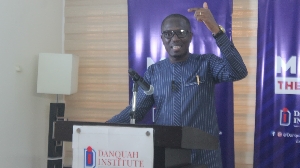Opinions of Friday, 5 February 2010
Columnist: GNA
The text message that robbed Ghanaians of sleep
A GNA feature by Nana Kodjo Jehu-Appiah
Accra, Feb. 3, GNA - It was not a good news at all for Madam Mary Akosua Darkwaa, a 63-year-old trader at Abesim, near Sunyani, to wake up in the middle of the night to receive a call from his son, who rang from Koforidua to alert her to vacate her room due to news of an impending earthquake.
She told the Ghana News Agency at Abesim on Monday January 18, that with shock and panic she called to inform other relatives and friends to follow her good example.
A content analysis of media reports of the earthquake scare is full of similar feeling of concern among Ghanaians to pass the false news from person to persons.
Mindful of the Haiti harrowing experience, the wild rumours that were sparked on Sunday night sent tens of thousands of panic stricken Ghanaians into the streets and the open where many spent the night. Throughout the night, Ghanaians spread the rumours using text messages, mobile and fixed line phones calls to warn their friends and relatives, who reacted by knocking on doors and shouting out to other people to come out of their rooms to avoid the looming disaster. Reports from the Central Region indicated that people could be heard praying to God to avert the quake.
A public servant told the GNA on condition of anonymity in Cape Coast that she was so scared that when her five-year old child asked to be taken indoors to attend to nature's call, she refused to do so. Mr George Senaya, a student of the University of Education, Winneba, said as a Christian he knew that disasters like earthquakes are to be expected in the end times.
Despite the panic created, there were others who either did not hear or just ignored the alarm as illogical and a scam. The incident, however, ensured punctuality to work and school as people woke up much earlier than they normally did.
The original rumour, cited the US National Aeronautics and Space Administration and the British Broadcasting Corporation as the source, but these have proved unfounded.
The Ministry of Information dropped a reassuring statement dispelling reports that an earthquake will be hitting parts of Ghana. The Director of the Geological Survey Department, Mr John Agyei Duodu, urged the national security operatives to investigate the source of the rumours, fish out the brains behind it and deal with them to serve as a deterrent.
Mr Duodu said persons, who circulated the rumour, must have done it out of mischief to create fear. Speaking to the GNA in Accra, Mr Duodu said the Department had its laid down procedures of circulating information to prevent unnecessary panic. Mr Duodu said although the nation was not considered as an earthquake prone zone in the world it had had its fair share of earthquakes. Giving the catalogue of the earthquake calendar of the country, Mr Duodu said there had been damaging earthquakes in 1615; 1636; 1862; 1906 and 1939. The one recorded in 1615, for example, destroyed Takoradi. In 1636, an earthquake occurred in Axim and the whole of East Nzema was badly shaken. It caused widespread collapse of buildings in that area. The 1939 earthquake in Ghana, which registered 6.5 on the Richter scale, took the lives of 17 people and property worth one million British pounds were destroyed. Additionally, the country had experienced earthquakes in 1997 and 2003 with the most recent being in 2005.
The earthquake prone areas in the country include Accra; Gomoa Nyayano; Ho; Axim; Akuapem Ridge; Elmina and Cape Coast. Mr Duodu said earthquake, as a natural disaster, could only be monitored and cannot be predicted. "Present technology has not made it possible for the detection of such natural disasters like earthquake and volcano. It is a natural disaster that cannot be seen.
"What scientists have been able to do was to invent technology which can monitor its magnitude and the epicentre. after the occurrence. An earthquake occurs as a result of the sudden release of energy in the earth's crust that creates seismic waves. They are normally recorded with a seismometer, also known as a seismograph. The moment the magnitude of an earthquake registers above 3.0 on the Richter scale, it causes serious damage over large areas. At the earth's surface, earthquakes manifest themselves by shaking and sometimes displacing the ground.
When a large earthquake epicentre is located offshore, the sea bed sometimes suffers sufficient displacement to cause a tsunami, Mr Doudu said. He noted that the shaking during earthquakes could also trigger landslides and occasionally volcanic activity.
In a related development, the National Disaster Management Organisation (NADMO) called on the media to be circumspect in reporting, commenting, discussing and writing about disasters.
It also entreated the public to take a cue from the effects of false reportage on disasters. NADMO was reacting to the earthquake scare in a statement issued in Accra by Mr Kofi Portuphy, the National Co-ordinator. It said earthquakes were natural occurrences that could not be prevented; however, their effects could be mitigated when the right things were put in place.
It includes abiding by the national building regulations, building of earthquake resilient structures by seeking professional advice from geologists, architects and engineers.
NADMO, therefore, urged the citizenry to take precautionary measures against natural disasters such as earthquakes, floods and windstorms. "In an event of an earthquake avoid standing close to buildings; trees; pylons; poles or on bridges. If indoors hide under stable objects such as tables and beds to avoid falling objects. Cautiously move into open spaces after the initial shock and remain outdoors," it added. The earthquake scare has come and gone but it has awakened the nation to the need to mount an educational campaign to equip the citizenry with sufficient knowledge to respond to earthquakes to reduce the number of casualties in case any happens.












